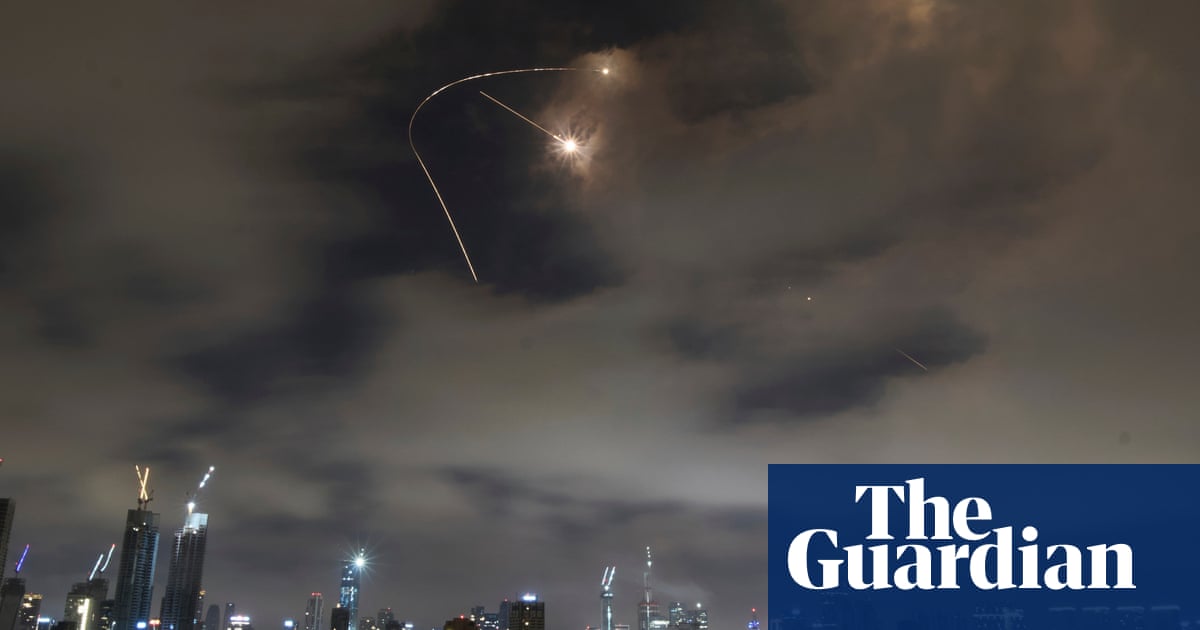Iran andIsraelexchanged fresh strikes early on Saturday, after Tehran said it would not negotiate over its nuclear programme while under threat and Israel claimed its attacks had delayed Iran’s potential to develop a nuclear weapon by “at least two or three years”.
Shortly after 2.30am the Israeli military warned of an incoming missile barrage fromIran, triggering air raid sirens across parts of central Israel, including Tel Aviv, as well as in the Israeli-occupied West Bank.
Interceptions were visible in the sky over Tel Aviv, with explosions echoing across the metropolitan area as Israel’s air defence systems responded. An Israeli military official said Iran had fired five ballistic missiles and that there were no immediate indications of any missile impacts. There were no initial reports of casualties.
At the same time, Israel launched a new wave of attacks against missile storage and launch infrastructure sites in Iran, the Israeli military said.
The war started whenIsrael launched hundreds of airstrikes on Iranlast Friday morning, in what it said was an operation aimed at preventing Iran from obtaining a nuclear weapon. Iran quickly responded with a barrage of missiles and drones, triggering a tit-for-tat cycle of bombing between the two countries.
Israel knocked out much of Iran’s air defences in its initial wave of attacks and Israeli jets have operated with relative freedom over Iran. Iran has sent a steadily diminishing number of ballistic missiles into Israel and managed to get some past air defences,hitting a hospital in southern Israelon Thursday and injuring about 80 people.
Israeli bombing has killed at least 639 people and wounded 1,326, according to Iranian media, while Iranian missiles have killed at least 25 people and wounded hundreds in Israel.
As fighting continues to escalate, the Israeli military chief of staff, Lt Gen Eyal Zamir, saidIsraelis must prepare for “difficult days” ahead.
He said on Friday: “To remove a threat of such magnitude, against such an enemy, we must be ready for a prolonged campaign. Day by day, our freedom to operate is expanding and the enemy’s is narrowing.”
In an interview published on Saturday, Israel’s foreign minister said the strikes on Iran had delayed Tehran’s potential to develop a nuclear weapon by “at least two or three years”.
Israel’s offensive – which has hit hundreds of nuclear and military sites, killing top commanders and nuclear scientists – has produced “very significant” results, Gideon Saar told German newspaper Bild.
“We already achieved a lot, but we will do whatever we can do. We will not stop until we will do everything that we can do there in order to remove this threat,” he said.
Speaking in Geneva, where he wasmeeting his counterparts from the UK, France and Germany, the Iranian foreign minster, Abbas Araghchi, said Iran was determined to defend its territorial integrity and sovereignty “with all force”.
But there was no sign of any breakthrough, and Araghchi said Iran would only consider a resumption of diplomacy with Washington if Israel halted its bombardment.
Late on Friday,Donald Trumpsaid it was unlikely he would pressure Israel to scale back its offensive to allow negotiations, telling reporters: “I think it’s very hard to make that request right now. If somebody is winning, it’s a little bit harder to do than if somebody is losing, but we’re ready, willing and able, and we’ve been speaking to Iran.”
The US president reiterated that he would take as longas two weeks to decide whether the US should enter the conflicton Israel’s side, enough time “to see whether or not people come to their senses”. He doubted negotiations with European officials would be able to secure a ceasefire, he added.
“Iran doesn’t want to speak to Europe, they want to speak to us,” Trump said. “Europe is not going to be able to help in this one.”
Israel is keen for the US to jump into the fray, as only the US possesses the capacity to strike Iran’s most heavily fortified nuclear facility, the Fordow uranium enrichment site, which lies up to 100 metres under a mountain near Qom.
On Friday, Trump said his director of national intelligence, Tulsi Gabbard, had been wrong in suggesting there was no evidence Iran is building a nuclear weapon.
In March, Gabbard testified to Congress that the US intelligence community continued to believe that Tehran was not building a nuclear weapon.
Trump began to publicly contest that assessment after the Israeli prime minister,Benjamin Netanyahu, claimed he launched the war because Iran was on the threshold of obtaining a nuclear bomb.
On Friday, Gabbard said in a post on social media that the media had taken her March testimony “out of context” and was trying to “manufacture division”, adding: “America has intelligence that Iran is at the point that it can produce a nuclear weapon within weeks to months, if they decide to finalise the assembly. President Trump has been clear that can’t happen, and I agree.”
With Reuters and Agence France-Presse
